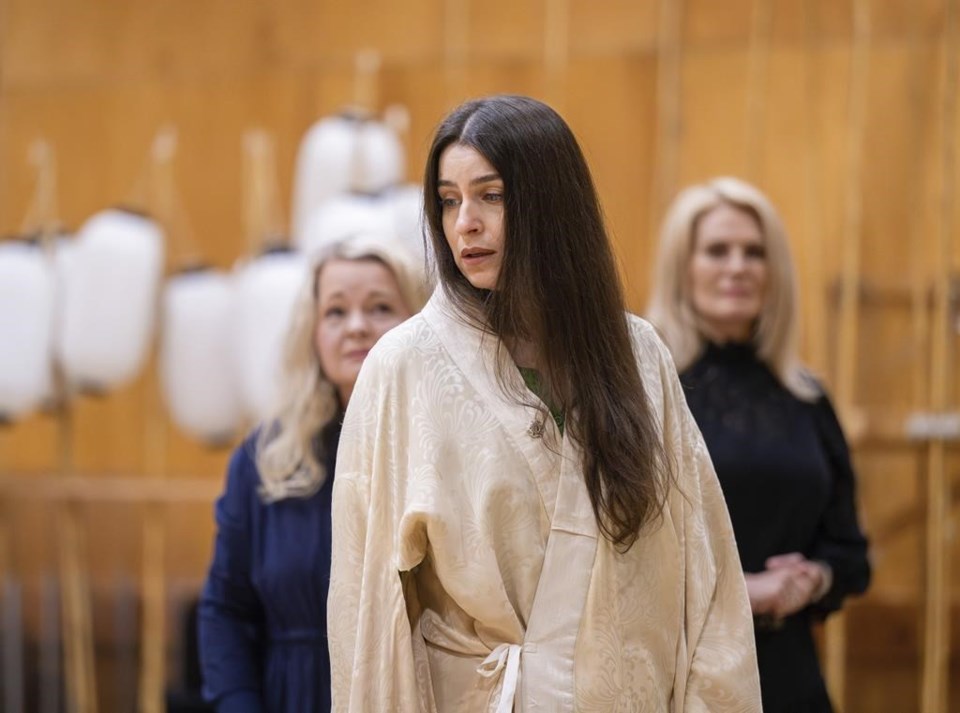NEW YORK (AP) ā Asmik Grigorian laughs when she recalls that she had been singing professionally for more than a decade when the International Awards proclaimed her the ābest young female singerā of 2016.
āSo for 12 years I was nothing, and then I immediately became the best!ā the Lithuanian soprano joked in an interview.
Now at the peak of her career and seemingly able to sing just about any role she chooses, from Dvorakās lyrical āRusalkaā to Pucciniās dramatic āTurandot,ā Grigorian is about to make her Metropolitan Opera debut in another Puccini classic, āMadame Butterfly.ā
āMy only regret is not having booked her sooner,ā said Met general manager Peter Gelb. āAsmik is an operatic force of nature, one of the greatest and most complete vocal and acting packages in recent operatic history.ā
Growing up in Vilnius she had plenty of exposure to opera. Both her parents, tenor Gegam Grigorian and soprano Irena Milkeviciute, were opera singers and both appeared at the Met, where Asmik traveled with them while a young girl.
When she launched her own career, she took pains not to trade on the family fame.
āI was pretty successful in that,ā Grigorian said, ābecause even now many people say, āOh you have the same name, you know he was a great tenor,ā and I say āYeah, I know, he was my father.āā
It took her many years from her 2004 debut in Norway at age 23 as Donna Anna in Mozartās āDon Giovanniā to achieve the combination of dramatic intensity and seamless vocalism that have opera houses around the world competing for her talents.
āIn the beginning I always had a reputation as a pure stage animal who is not really 100% able to control my voice,ā she said. āIt was true.
āI was too young,ā she added. āControl demands experience, so of course I failed a thousand, million times and this is an amazing thing to do. I think itās the biggest sadness of the generation now because we are so visible and people are not allowing themselves to fail anymore, and how can you develop without failing?ā
Eventually the lack of a dependable vocal technique caught up with her. āYou come to the age where you canāt just rely on nature,ā she said. āI hurt my voice, I hurt my body, I hurt everything.ā
By 2012, she said, āI could not sing anything any more. And I decided, OK I have two choices: I can continue killing myself, or I start from the beginning.ā
Grigorian worked hard for years to build her technique and knew she had succeeded when a critic said āshe is perfect technically, and itās so boring because she is not so interesting as an actress.ā
āThen I thought, now I did it!ā Grigorian, 42, said. āBut when you are so focused on technique itās a bit too cold.ā Finding she could trust her voice allowed her to flourish again as a performer āand a different type of magicā started to happen.
Triumph after triumph followed. Of her 2018 Salzburg role debut as Salome in the Richard Strauss opera, Financial Times critic Shirley Apthorp raved that āhers is a Salome to end all Salomes ā¦ Grigorianās charisma sweeps it all in her wake.ā
Three years later when she made her debut at the Wagner shrine in Bayreuth, Germany, as Senta in āThe Flying Dutchman,ā Joshua Barone in The New York Times called her performance āluxuriously lyricalā and noted she was āmet with a roaring ovation.ā
Acclaim also greeted her last year when she took on two parts many thought would be too taxing for her voice: Verdiās Lady Macbeth in Salzburg and Turandot in Vienna.
Her fellow singers seem as enthusiastic about her as critics and audiences.
āShe is the best partner Iāve ever had on stage. End of discussion,ā said tenor Joshua Guerrero, who recently sang opposite her in āMadame Butterflyā at Londonās Royal Opera House. He cited in particular āher willingness to remove ego and to put the other person forward when they are singing their part.ā
As Butterfly, Guerrero said she brought to the role āa beautiful stillness ā¦ She played it very naively, with a childlike approach.ā
Grigorian explains: āI like to hear a lyrical sound with very tender colors because sheās a 15-year-old girl.
āBut at the same time, itās pretty challenging,ā she said, because a singer with too light a voice will struggle to be heard over Pucciniās thick orchestral textures.
To avoid a steady diet of heavier roles, Grigorian is diligent about mixing up her repertoire.
āI definitely donāt consider myself a dramatic soprano or a Wagnerian soprano,ā she said. āIf I sing something dramatic, I put something lyrical in the middle so I keep my flexibility.ā
Thatās why it comes as only a mild surprise to hear that ā despite misgivings ā one of her new roles for next season in Vienna is the Druid princess heroine of Belliniās āNorma,ā a part that demands the utmost dexterity with its long lyrical lines and rapid ornamentation.
āI have no clue. I never did any bel canto,ā she said. āIām very nervous and probably I will be the worst Norma on the planet. But I do that because I need to keep my voice flexible. I want to learn many new things.ā
Grigorian is at the Met this season for five performances starting Friday, with the last one on May 11 to be shown live in movie theaters. But sheāll be back in future seasons to sing āSalome,ā Janacekās āJenufaā ā and no doubt more.
Mike Silverman, The Associated Press




